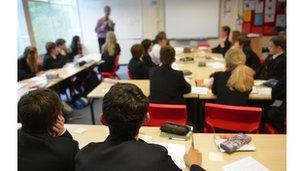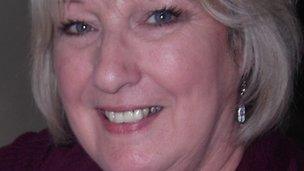GCSE English: Teachers' anger over generous marking claim
- Published
- comments

The teaching profession is angry at claims they marked pupils' work optimistically
Teachers have hit out at claims they marked GCSE work too generously, as new data show the decline in pupils getting at least a C in English.
More than 600 schools in England, Wales and Northern Ireland saw a fall of 10% or more in the proportion of pupils achieving grades A*-C on last year.
The figures indicate the scale of this summer's English GCSE grading debacle.
In its final report, external on the controversy, exams watchdog Ofqual says pressure to get good grades saw teachers overmark.
The new data - given to the Education Select Committee in response to questions it raised of Ofqual in relation to the grading row - shows 611 schools saw a decrease of 10% or more in the number of candidates getting A*-C in English.
Head teachers have said that tens of thousands of students received lower GCSE English grades than expected this year, mainly around the C/D border.
Controlled assessment
The fiasco centres around the controlled assessment aspect of the new modular English GCSE qualification, sat for the first time this summer.
Controlled assessment is GCSE coursework which is sat in the classroom under strict supervision and marked by teachers.
John Townsley, head teacher: "In many ways, Ofqual is covering its own tracks"
Ofqual, which regulates exams in England and vocational qualifications in Northern Ireland, says teenagers have been let down by an exams system where teachers are under intense pressure to achieve good grades.
Its report says teachers in some of England's secondary schools were guilty of "significantly" over-marking pupils' GCSE English work this summer in order to boost results.
"The regulator concludes that so much weight on one grade in one subject as part of accountability and performance measures created perverse incentives for schools in the way they marked controlled assessment and led to the over-marking," the report says.
But Glenn Smith, principal of Honiton Community College in Devon, told the BBC that teachers in his English department used "stringent" measures to ensure they were marking these assessments fairly and consistently.
"An awful lot of work goes into ensuring their marking is accurate - the pressure they live with is intense," he said.
"To say they've marked up is outrageous."

Val Tyreman says external moderators should have picked up the problem
Philip Rush, deputy head teacher at St Peter's High School, Gloucester, said: "The fiasco surrounding the unfairness of this summer's grades is a political not an educational fiasco.
"St Peter's High School deplores the slur made on the school's teachers, and on all English teachers working in England, by Ofqual's comments, and seeks to have them withdrawn."
Val Tyreman, a science teacher from Stockton-on-Tees, described Ofqual's report as "appalling".
"I cannot understand how they can blame teachers if external moderation procedures were properly applied. I don't see how teachers can be accused of generous marking."
John Townsley, executive principal of two academy schools in Leeds, said: "The problem is that Ofqual were asleep in the early part of the award.
"And that meant that many Cs were given out generously in June 2011 and Jan 2012, resulting in very little being left for the students at the end of the course. That's fundamentally unfair and it's not addressed in this report. "
'Outrageous'
Malcolm Trobe, deputy general secretary of the Association of School and College Leaders, said: "For Ofqual to suggest that teachers and schools are to blame is outrageous and flies in the face of the evidence.
"The accountability measures do place tremendous pressure on teachers and schools, especially at GCSE grade C, but to say that teachers would compromise their integrity to the detriment of students is an insult."
Russell Hobby, general secretary of the National Association of Head Teachers, said: "It is a diversion to attempt to blame teachers for following the rules they were given.
"If your elected government tells you this is the right thing to do, if your performance is measured on it and if you are sacked for failing to achieve it, you have no choice but to do it."
Teachers' anger over the marking fiasco was reflected in a survey in the Times Education Supplement.
The survey of 467 secondary schools in England found 93% had lost faith in Ofqual, with more than half saying they had no confidence in the regulator.
Responding to the survey schools described the watchdog as "underhand", "incompetent", "bullying and callous" and "a Gove puppet".
Glenys Stacey, Ofqual: "It's not the teachers' fault"
New qualification
Speaking to BBC Radio Four's Today programme, Ofqual chief executive Glenys Stacey said she believed teachers had marked the test "optimistically" rather than with a deliberate intention to inflate grades.
She said: "Teachers are not making up marks here. They are doing their level best to do the best for their students and they are bound, given the pressures they are under, to take the most optimistic view.
"There's an amount of tolerance... some leeway in the marking. But if enough teachers mark up to that tolerance, mark up to that limit, then overall it has a national effect," she added.
This summer's English GCSEs were a new modular qualification, with pupils sitting written exam papers and controlled assessment, and schools decided when pupils submitted that assessment work and sat exams.
Ofqual's research found many schools used the marks pupils received in their first exams and the January grade boundaries to work out what score a pupil would need in their controlled assessment to get a certain grade and marked it accordingly.
Most of the controlled assessment work was submitted in the summer and when examiners saw evidence of over-marking, exam boards raised grade boundaries, leading some pupils to receive poorer grades than expected.
In Wales, ministers ordered a regrade for pupils who got a lower grade than expected with Welsh board WJEC, but Ofqual did not order such a move in England.
Now an alliance of pupils, schools, councils and professional bodies has launched a legal challenge over the fiasco, calling for results to be re-graded.
League tables
Schools in England are measured on the percentage of pupils who get five A*-C GCSEs, including English and maths.
This measure is included in league tables, with schools expected to have at least 40% of students reaching this standard.
The Ofqual report says the new qualifications "reinforced the trend" of schools running the GCSE schools years (Years 10 and 11) as a "tactical operation to secure certain grades and combinations of grades".
"This has come to be seen as 'what good schools do' despite the awareness of many teachers and parents that the concept of broad and deep learning can get lost along the way," it says.
Ofqual says it will take action to ensure there are no repeats of this year's problems in 2013.
The watchdog also says this year's debacle proves the proposal by Education Secretary Michael Gove to end the modularisation of GCSEs in England by 2014 is correct.
Ms Stacey said the new modular English GCSEs at the heart of the fiasco were too flexible and "not sufficiently resilient" to take the pressure they were put under.
"It is so flexible that, when subjected to the pressure of the accountability system, it can buckle," she said.
- Published2 November 2012
- Published13 February 2013
- Published2 November 2012
- Published2 November 2012
- Published11 October 2012